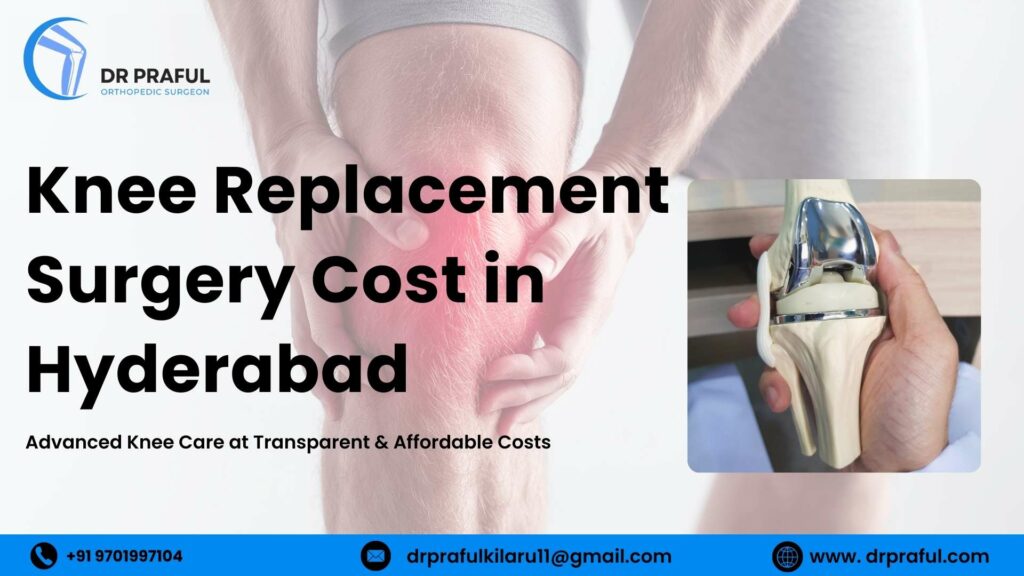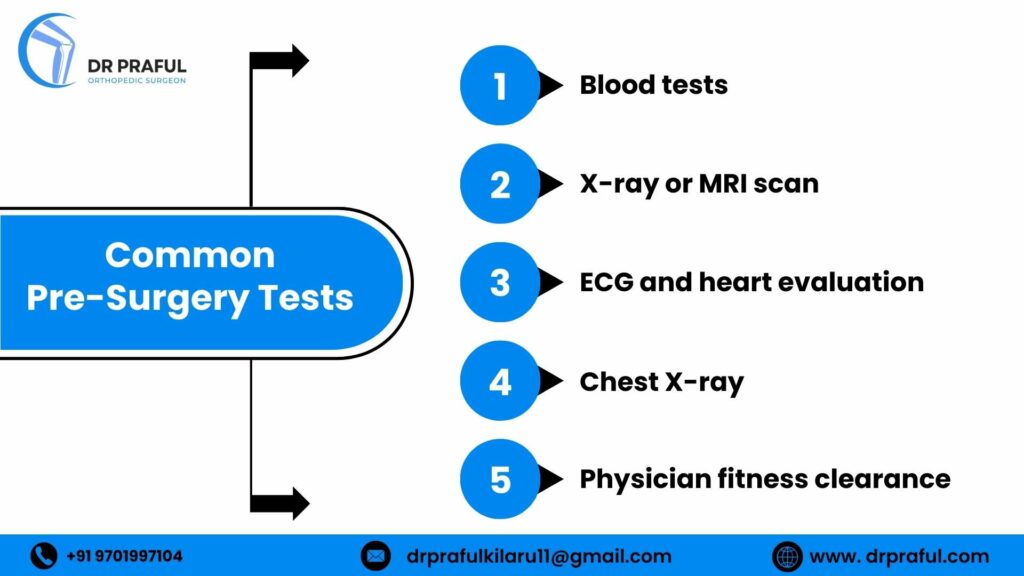Knee Replacement Surgery Cost in Hyderabad

Knee Replacement Surgery Cost in Hyderabad is an important factor many patients consider while planning their treatment. Knee pain has become a common health issue affecting people across different age groups. Joint problems are increasing due to lifestyle changes, obesity, sports injuries, and arthritis. Many patients delay treatment because they are worried about surgery expenses. Understanding the knee replacement surgery cost in Hyderabad helps patients plan treatment at the right time and avoid further complications. Hyderabad is one of India’s leading healthcare destinations, offering advanced orthopedic treatments, experienced surgeons, and modern surgical technology. Compared to many metro cities, knee replacement surgery in Hyderabad is often more affordable while maintaining high medical standards.
What is Knee Replacement Surgery?
Knee replacement surgery is a procedure where damaged cartilage and bone in the knee joint are replaced with artificial implants. It is usually recommended when pain is severe and does not improve with medicines, physiotherapy, or lifestyle changes. The main goal of this surgery is to reduce pain, improve mobility, and help patients return to normal daily activities.0
Knee Replacement Surgery Cost in Hyderabad
In Hyderabad, knee replacement surgery costs usually range between approximately ₹1.5 lakh to ₹4.5 lakh per knee, depending on the hospital, implant type, and surgical technology used. Some advanced robotic or premium implant surgeries may cost more. The final cost is decided after patient evaluation, diagnostic tests, and implant selection. The surgery package generally includes hospital stay, surgeon fees, operation theatre charges, implant cost, and basic medicines. However, some additional expenses like physiotherapy and follow-up care may be separate.
Main Factors Affecting Knee Replacement Surgery Cost
- Type of surgery (Total knee replacement, partial knee replacement, robotic surgery)
- Implant type (Indian implant, imported implant, customized implant)
- Hospital category (Standard hospital or corporate hospital)
- Surgeon experience and specialization
- Room category and hospital stay duration
- Patient medical condition and complication risk
- Pre-surgery tests and post-surgery rehabilitation
Cost Breakdown of Knee Replacement Surgery
Knee replacement surgery is made up of multiple components. Pre-surgery costs include diagnostic tests like blood tests, X-rays, ECG, and sometimes MRI scans. Surgery costs mainly include surgeon fees, implant charges, and operation theatre charges. Post-surgery cost includes hospital stay, medicines, physiotherapy sessions, and follow-up consultations. Patients should always ask hospitals whether they are offering package pricing or item-based billing.
Why Patients Choose Hyderabad for Knee Replacement
Hyderabad has become a preferred destination for orthopedic surgeries because it offers modern surgical technology, skilled orthopedic surgeons, and cost-effective treatment options. Many patients from nearby areas like Kukatpally, Madinaguda, Miyapur, LB Nagar, and Secunderabad travel to Hyderabad for joint replacement procedures because of the good hospital infrastructure and post-surgery rehabilitation facilities.
Benefits of Knee Replacement Surgery
Knee replacement surgery significantly improves patients’ quality of life. Most patients experience major pain relief and improved walking ability. The surgery also helps patients return to daily activities, improves sleep quality, and reduces dependency on pain medications. Modern implants are designed to last for many years when proper care and physiotherapy are followed.
Hospital Stay and Recovery Time
The knee replacement surgery procedure usually takes about 1.5 to 2 hours. Patients generally stay in the hospital for around 4 to 5 days, depending on recovery speed and overall health condition. Initial recovery usually takes around 4 to 6 weeks, while full recovery and return to normal activities may take around 3 to 6 months. Physiotherapy plays a very important role in recovery success.

Insurance Coverage for Knee Replacement Surgery
Most health insurance policies in India cover knee replacement surgery if it is medically necessary and the waiting period is completed. Insurance usually covers hospitalization costs, surgery charges, and implant costs up to policy limits. Patients should confirm room rent limits, implant coverage, and co-payment terms before planning surgery.
Who Should Consider Knee Replacement Surgery
Patients who have severe knee pain daily, difficulty walking, pain even during rest, or reduced mobility despite medicines and physiotherapy should consult an orthopedic specialist. Early consultation helps in better planning and faster recovery outcomes.
Precautions Before Knee Replacement Surgery
- Control diabetes and blood pressure
- Maintain healthy body weight
- Stop smoking and alcohol consumption
- Follow the doctor’s medication advice
- Prepare home support for post-surgery care
Life After Knee Replacement Surgery
Most patients return to normal life after recovery. Patients can usually walk comfortably, perform daily household activities, travel, and do light exercises. High-impact activities like jumping or running are usually avoided to protect implant life.
Types of Knee Replacement Surgeries Available in Hyderabad
Knee replacement surgery differs from person to person because every patient’s knee condition and health situation is unique. Doctors recommend different types of procedures based on joint damage, age, activity level, and overall health. In Hyderabad, most advanced hospitals offer multiple knee replacement options using modern technology and high-quality implants. Choosing the correct surgery type helps improve implant life and recovery outcome.
Main Types of Knee Replacement Surgeries
- Total Knee Replacement (Complete joint replacement)
- Partial Knee Replacement (Only damaged portion replaced)
- Bilateral Knee Replacement (Both knees operated together or staged)
- Robotic-Assisted Knee Replacement (High precision technology-based surgery)
Robotic Knee Replacement – Is It Worth the Cost?
Robotic knee replacement is becoming more popular in Hyderabad due to better surgical precision and faster recovery. In this procedure, robotic technology helps the surgeon plan and perform surgery more accurately. This may reduce implant positioning errors and improve long-term results. However, robotic surgery is usually more expensive than traditional knee replacement. Patients should discuss with their doctor whether robotic surgery is suitable for their condition or not.
How to Choose the Right Knee Implant
Knee implants are made using metal alloys, ceramic materials, or high-grade plastic components. The choice of implant depends on patient age, weight, activity level, and budget. Some implants are designed for longer durability and better flexibility.
Important Points While Selecting a Knee Implant
- Implant durability and expected lifespan
- Surgeon familiarity with implant brand
- Patient activity level and lifestyle
- Cost difference between Indian and imported implants
- Warranty or performance track record
Tests Required Before Knee Replacement Surgery

Before surgery, doctors perform multiple tests to ensure the patient is medically fit. These tests help reduce surgery risk and help plan anesthesia and surgical procedures safely. Pre-surgery evaluation is very important for diabetic patients, heart patients, and elderly patients.
Common Pre-Surgery Tests
- Blood tests
- X-ray or MRI scan
- ECG and heart evaluation
- Chest X-ray
- Physician fitness clearance

Risks and Complications of Knee Replacement Surgery
Like any surgery, knee replacement also has some risks, but serious complications are rare when surgery is performed in experienced hospitals. Proper surgical planning, a sterile operating theatre environment, and good post-surgery care can prevent most complications.
Possible Risks (Rare Cases)
- Infection
- Blood clot formation
- Implant loosening over time
- Joint stiffness
- Nerve or blood vessel injury
Physiotherapy Importance After Knee Replacement
Physiotherapy is one of the most important parts of recovery. Without proper physiotherapy, patients may experience stiffness, weakness, or a limited range of motion. Regular exercise helps strengthen muscles, improve joint flexibility, and increase walking confidence.
Benefits of Post-Surgery Physiotherapy
- Faster recovery
- Better knee movement
- Reduced swelling and stiffness
- Improved muscle strength
- Longer implant life
Diet and Nutrition After Knee Replacement Surgery
Proper nutrition helps improve wound healing, muscle strength, and immunity after surgery. Patients should focus on protein-rich foods and a balanced diet to support faster recovery.
Recommended Foods After Surgery
- Protein-rich foods (Eggs, dal, chicken, paneer)
- Calcium-rich foods (Milk, curd, leafy vegetables)
- Vitamin C foods (Oranges, lemon, amla)
- Iron-rich foods (Green vegetables, dates)
- Adequate water intake
When to See a Doctor for Knee Pain
Many patients ignore knee pain for years, which worsens joint damage. Early consultation helps delay or avoid surgery in some cases. If surgery is required, early planning improves recovery and reduces complications.
Warning Signs You Should Not Ignore
- Knee pain while walking or climbing stairs
- Knee swelling regularly
- Knee stiffness in the morning
- Knee deformity or bending
- Pain even during rest
Financial Planning Tips for Knee Replacement Surgery
Planning finances before surgery reduces stress and helps patients focus on recovery. Many hospitals provide EMI options, insurance support desks, and package cost structures.
Smart Financial Planning Tips
- Check insurance coverage before admission
- Compare hospital package pricing
- Ask about implant options and cost difference
- Enquire about EMI or payment plans
- Confirm post-surgery physiotherapy cost

Final Thoughts
Knee replacement surgery is a safe and highly successful procedure when performed by experienced orthopedic surgeons. The knee replacement surgery cost in Hyderabad is relatively affordable compared to many other cities, while still offering advanced medical care. Understanding cost factors, treatment process, and recovery timeline helps patients make confident healthcare decisions.
Frequently Asked Questions
1. How much does knee replacement surgery cost in Hyderabad?
Knee replacement surgery in Hyderabad usually costs between ₹1.5 lakh and ₹4.5 lakh per knee, depending on the hospital, implant type, and surgery method.
2. Why does knee replacement surgery vary between hospitals?
Cost changes based on hospital facilities, surgeon experience, implant brand, room category, and technology like robotic surgery.
3. Is knee replacement covered by health insurance in India?
Yes, most insurance policies cover knee replacement if it is medically necessary and the waiting period is completed.
4. What is included in the knee replacement surgery package cost?
Usually includes surgery charges, hospital stay, implant cost, OT charges, and basic medicines.
5. Does robotic knee replacement cost more than normal surgery?
Yes, robotic knee replacement is usually more expensive because of advanced technology and precision equipment.
6. How long does knee replacement surgery take?
The surgery usually takes about 1.5 to 2 hours.
7. How many days of hospital stay are needed after knee replacement?
Most patients stay in the hospital for around 4 to 5 days, depending on recovery.
8. How long does recovery take after knee replacement surgery?
Basic recovery takes 4 to 6 weeks. Full recovery may take 3 to 6 months.
9. Is knee replacement surgery painful?
Pain is controlled using modern anesthesia and pain management medicines.
10. What is the success rate of knee replacement surgery?
Knee replacement has a high success rate, and most patients get long-term pain relief.
11. Can elderly patients undergo knee replacement surgery?
Yes, elderly patients can undergo surgery if they are medically fit.
12. Can diabetes or BP patients undergo knee replacement surgery?
Yes, but sugar and BP should be controlled before surgery.
13. How long does a knee implant last?
Most knee implants last around 15 to 25 years, depending on activity level and care.
14. When should I consider knee replacement surgery?
If knee pain is severe, daily activities are difficult, and medicines are not helping, surgery may be recommended.
15. Is physiotherapy necessary after knee replacement?
Yes, physiotherapy is very important for proper recovery and movement.
16. Which type of knee implant is best?
The best implant depends on the patient’s age, lifestyle, and the surgeon’s recommendation.
17. Can both knees be replaced at the same time?
Yes, bilateral knee replacement is possible in selected patients.
18. How soon can I walk after knee replacement surgery?
Most patients start walking with support within 1 to 3 days after surgery.
19. Are there risks in knee replacement surgery?
Risks are rare but may include infection, blood clots, or stiffness.
20. How do I choose the best hospital for knee replacement in Hyderabad?
Choose based on the surgeon’s experience, hospital infrastructure, infection control, and physiotherapy support.

